Q&A: Roger Maltbie on his life and times walking the fairways for NBC

Roger Maltbie is a national treasure.
The veteran pro turned roving reporter for NBC/Golf Channel had his workload cut back significantly this year to our everlasting chagrin but he still is making a few appearances here and there, including a few weeks ago in Napa at the Fortinet Championship, not far from his old stomping grounds as a NorCal golfer.
Wine Country is where Golfweek caught up with Maltbie for an hour-long chat that was so entertaining we’ve decided to split it into a two-part Q&A. And here’s some more good news: You can get another fix of Maltbie and his unique brand of humor this week as he takes part in the broadcast of the PGA Tour’s Shriners Children’s Open in Las Vegas.
GWK: What are you doing these days? How are you spending your time?
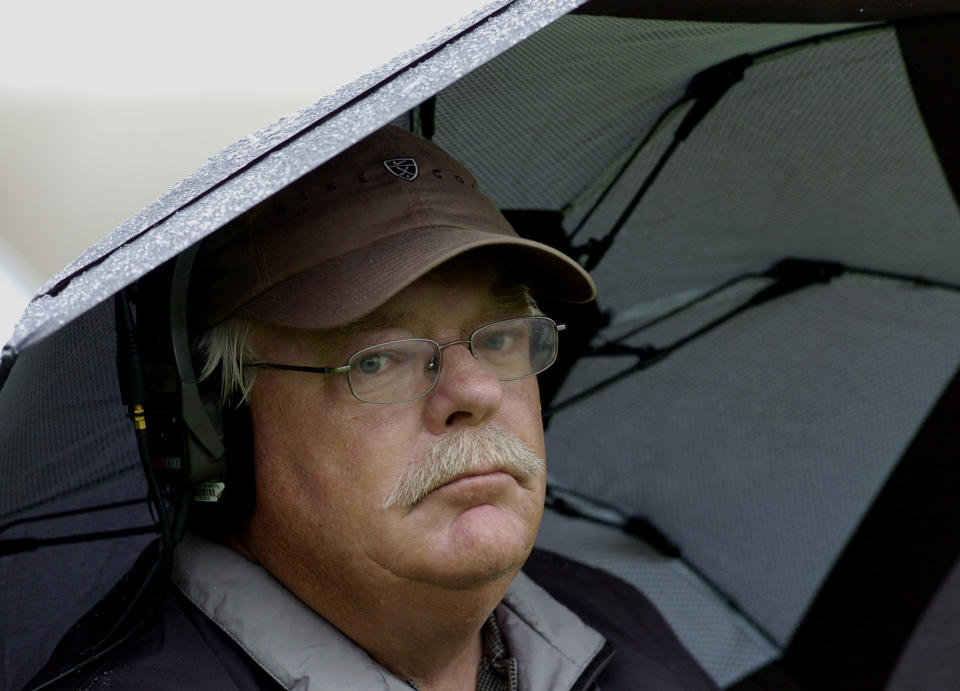
RM: I’m pretty good at doing nothing. I can’t honestly tell you I’m doing a whole lot.
GWK: Playing any golf?
RM: No. Physically can’t do it. I had my knee replaced in 2020. This one is on the highway for needing replacement. I developed stenosis, so I’m really, really tight in the lower back. I throw my arms at it. It kind of hurts to do it.
GWK: What do you miss most about not covering the PGA Tour regularly anymore?
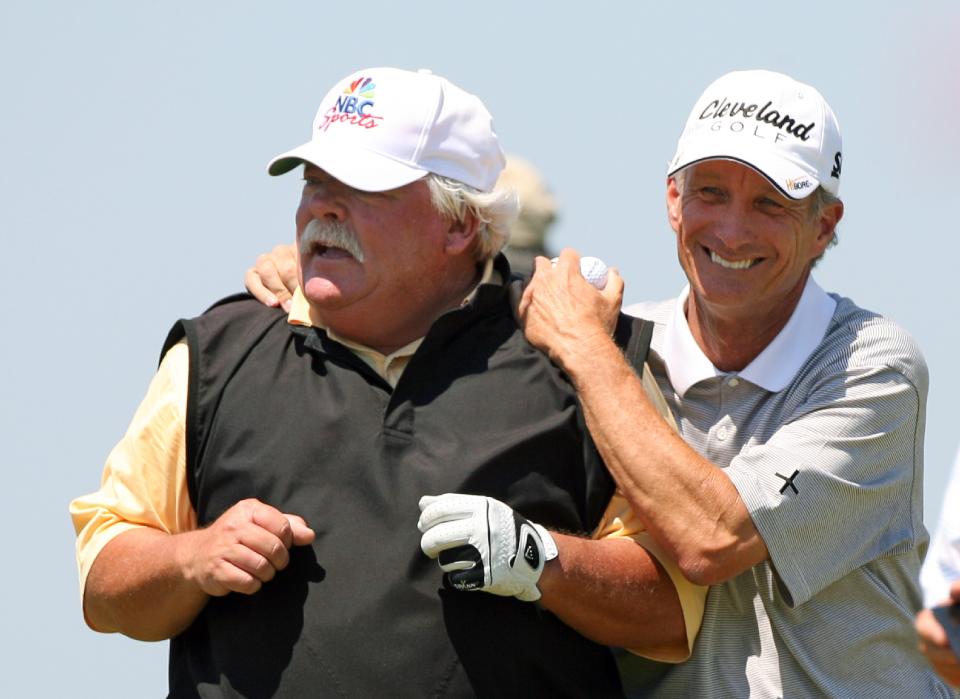
RM: Well, I miss watching the guys play. I’m in awe of the things these kids do. There was a while there that (Tommy Roy) would try to spell me from walking, put me in the tower, and I just never liked it up there. I wanted to see it. I’ve got a bigger monitor than that at home. I want to hear it in the air. I want to see it in the air.
The other part of it is missing the people. It becomes a bit of a family. I’ve been working with a lot of these people for over 30 years, and you miss it.
GWK: When did you realize you were more popular as a TV guy than as a golfer?
RM: I got my licks in as a player. There was a period where I was a pretty good player. But I wasn’t a star.
It is a source of fascination for me that as it turns out, I’m better known as a broadcaster than I was as a player. Certainly more recognizable and this and that. The career, again, it spanned so long, you’re talking into the fourth decade of doing it. When I first started, I was also a player. I knew all the guys. I knew their wives’ names, their kids’ names. I was one of them.
Then you transition to a period where they knew I played and then another generation comes in, and now they don’t even know you played golf. I won my last tournament in ’85, and these kids weren’t born.
GWK: What year did you start doing TV?
RM: I was asked in the late ’80s, about ’88. NBC auditioned me at Kapalua when that was an unofficial event at the end of the year. I thought, well, that’s pretty cool, I’ll go to Hawaii, see what this is like. I was rehabbing from my first shoulder surgery. I had a couple of those. They offered me a job.
A couple of weeks later, they said, we liked you, and would you like to do it. Well, the money wasn’t right, it was too many weeks and I couldn’t play anymore, and I said no.
They came back a couple years later in 1991. I’d had a second surgery on my shoulder, and I was rehabbing at the time, and they said, hey, we’ve got this new technology called the RF camera. It doesn’t have to be hard-wired, they could move around.
Larry Cirillo, the producer, called me and he said the leader at the old Bob Hope (The American Express now) could be on another course and they’d never see him, but now we can cover him. So we’d like you to come out and be that guy at the other golf course, if that happens, so on, so forth. I said, I’ll agree to do it if you let me do the broadcast of the Ryder Cup, which was going to be at Kiawah later in the year. They said, you’ve got a deal.
So I did the Hope and did the Ryder Cup. It was kind of funny that for the Sunday singles matches I had David Feherty versus Payne Stewart, and Feherty was wiping the floor with Payne. It wasn’t much of a match. Up ahead a couple of groups, Mark Calcavecchia had this big lead on Colin Montgomerie. I don’t know if you remember how all that shook out but I think Montgomerie won like the last four holes with bogeys or something like that. Calcavecchia fell apart, hit a shank on 17, and the match was very tightly contested. You really looked at that may cost the U.S. the Ryder Cup.
A guy named Terry O’Neill at the time was executive producer of NBC Sports and was there in the production truck. He gets in my ear, says Roger, leave your match. Go find Mark Calcavecchia and interview him.
I’m doing what I’m told, absolutely. So off I go, and I find him. He’s in the TV compound with Peter Kostis who was my instructor, and he was Calcavecchia’s instructor. Mark is beside himself. I mean, his eyes are swollen shut. He’s crying. He’d been sick into a garbage can. I don’t know what a nervous breakdown is technically, but this guy was on the edge. I mean, he was not good.
So Peter kind of looked at me, and I kind of went, I get it, because I’m a player. I’ve got these two events. This is the last deal I’m doing as far as I know. I’ve got no plans. So I go over to the production truck in the TV compound, opened the door. Terry O’Neill is standing in the doorway. He says, I told you to find Mark Calcavecchia and interview him. I said, I found him but he can’t talk. He goes, interview him; stay with him and interview him. I said, he can’t talk now. I’m still a player, Mark Calcavecchia is a friend of mine, as are all the guys on the team. I said, I’ve got a better idea. Why don’t you stay with him and you interview him, but I’m not doing it. You never heard another word from him the rest of the show. That was it for me.
A couple of weeks later, Mark Rolfing, who was the lead walker for NBC, left and went to ABC because they had the majors and NBC had no majors. So I get a call. We want to hire you. What? I figured, TV, that’s never going to happen after what I just did, the insubordination I just showed.
So they offered me this deal, and they didn’t have many tournaments. They might have had nine events. I got this feeling that I can still play and get my feet wet doing television. OK, I’ll give it a try.
So I started on a regular basis in ’92, and as it worked out, I could still play golf but I wasn’t the same player. I knew that. I just couldn’t do some of the things that I could before.
So I just kind of ended up staying in the television thing. CBS tried to hire me after my first contract. Dick Ebersol, who was our boss at the time, took great care of me, and I just ended up doing it all these years. It’s just kind of funny how it worked out. I never spent one minute thinking about doing television. Spent my whole life trying to figure out how to play golf, and as it turns out I made more money, more recognizable, go on down the line, from broadcasting as opposed to playing golf. Funny how that works.
GWK: What are you most proud of from your playing days?
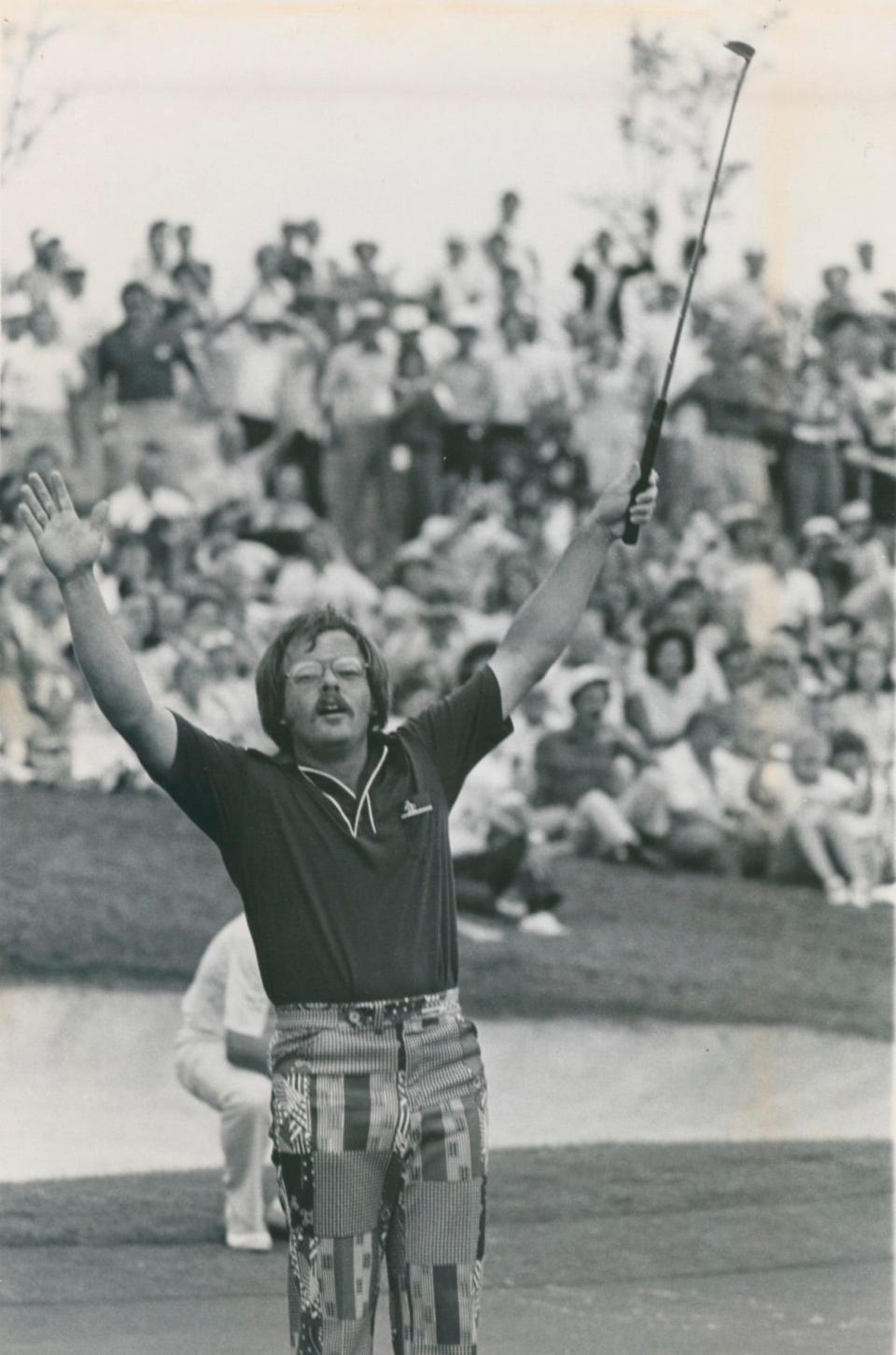
RM: Oh, gosh, that’s a good question.
Obviously winning your first one is a thrill. As it turns out, probably the most significant thing I did was the next one when I won the first Memorial Tournament, given what that event has become.
I’m proud to have won on a golf course of that caliber, and I won the World Series in ’85 at Firestone, and that’s another hell of a golf course. Back in the day, the distance we hit it and the clubs and balls we used, it was everything you could handle as a par-70.
Kind of interestingly, the first major championship I ever played in was in 1975, and here we are the first two rounds of the PGA Championship at Firestone. It’s the hardest golf course I ever saw and I get paired with Jack.
There’s a creek about 60 yards to the left of the first tee. I was so scared because I was kind of an unheralded guy. I had no big amateur reputation or anything. I wasn’t a big college star or anything like that. I only played golf out of the state of California a couple of times before I got on Tour.
So I won Quad Cities in ’75 opposite the British Open, then the next week Pleasant Valley, and the purse was as big as anything we had back then. It was 40 grand for first place, $200,000 purse.
So I won two in a row, went home for a couple weeks and I was Rookie of the Year, that stuff. I got more money than exists in the whole world and I’m having a great time with my buddies.
I show up at Firestone, get paired with Jack, and this is back in the day before there was any Golf Channel or cable or anything, and I’ve never met him, I’ve only seen him a few times, and I’m convinced that he is at home looking at the newspaper and going, Barbara, who is Roger Maltbie? He’s won two in a row!
We’re on the first tee and Jack is standing right there, and I’m thinking, he’s watching me, and he’s going to make his mind up if I’ve got any game or not and I’m so scared I can barely breathe. I hit it off the neck of the driver, through the gallery, and it went into this creek about 60 yards off the tee.
He was great. He put his arm around me and said, just relax, you’re going to be fine.
Now go from 1975 to 1985, and I shot four rounds in the 60s at Firestone, shot 268, which was one of the lowest totals they’d ever seen at that time. I think Lanny might have shot one shot better. Scores got lower later, but it was like, I can do that? It was just amazing.
GWK: What do you like about television golf, and what don't you like?
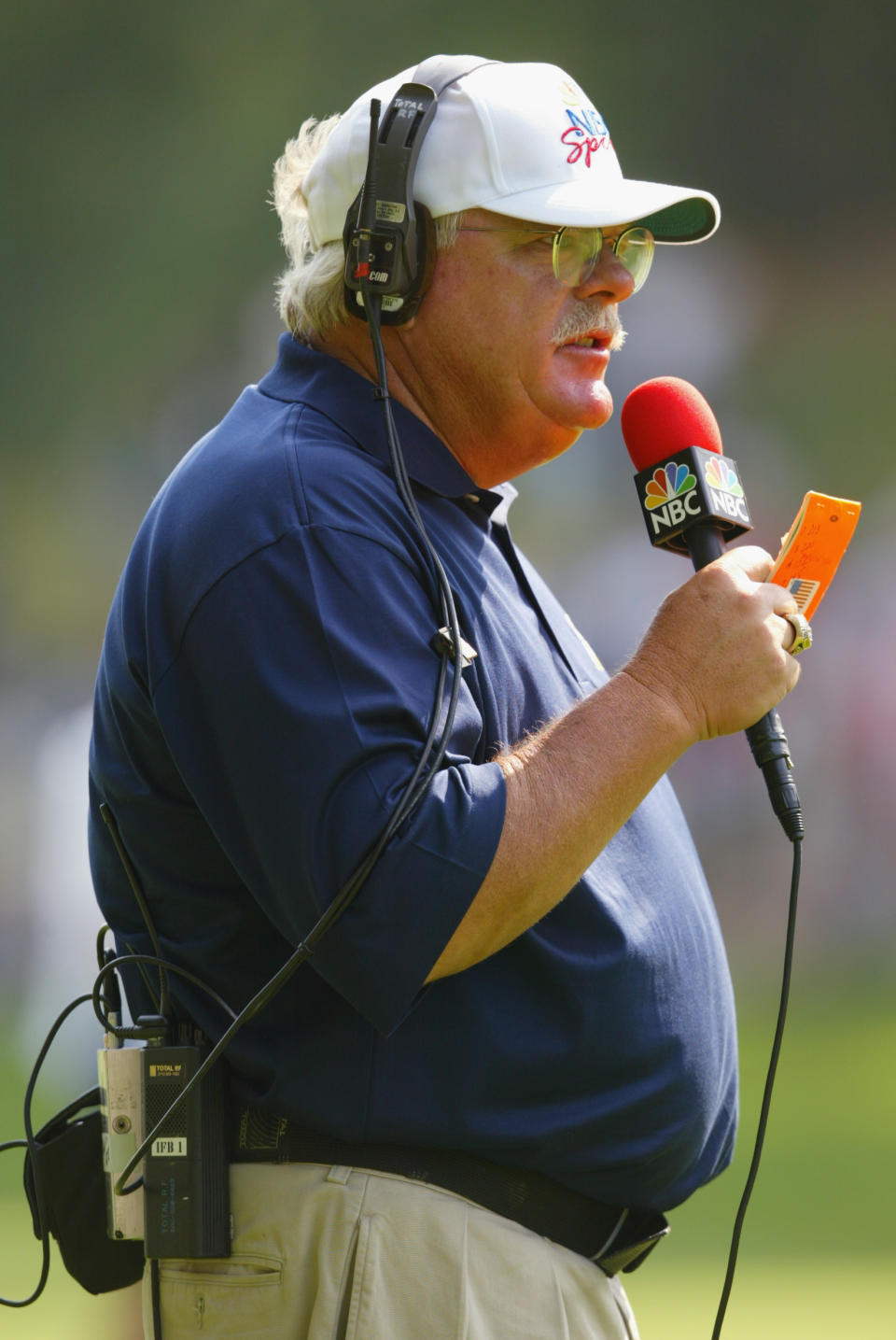
RM: I had a very myopic view of tournament golf. I’d go back home, people would ask me about this shot, that shot. I would say, I don’t know, I didn’t see it. I see three guys a day on Thursday and Friday and two guys a day on Saturday and Sunday. That’s all I see.
But what I liked about it is it had a lot of parallels with competitive golf in that when it’s your time, you’ve got to be ready. You’ve got to be prepared. You’ve got to have your thoughts together, this and that.
You’re going to make mistakes. When you make a mistake, you’ve got to get over it, otherwise it’s going to compound itself, just like playing golf. You don’t get a mulligan. All that was very similar, and when you did it right, it was like hitting one flush. When the words came out, you described it as briefly as you could, you made the point or you thought something would happen and it happened when the guy played the shot, it felt good. You had that immediate feedback.
GWK: Anything you don’t like about it?
RM: Well, you know, I’m certainly not going to use names and I’m certainly not going to be critical. It’s a hard sport to broadcast. You’ve got a lot of balls in the air at the same time. So it’s a very hard thing to do well.
If everybody kind of does their job, if you’ve got your host, your play-by-play guy, you’ve got your analyst who’s always open and who can always add his thoughts into what’s happening, but he needs time to do that, but what you’re trying to do, at least what we always tried to do at NBC is to humanize the players. Sometimes the players don’t realize we’re on their side because we’re trying to give that guy sitting at home a reason to pull for you. That’s our job.
If we give them a reason, more eyes are going to be on us, which is good for us and it’s good for you, so play with us. And it doesn’t always work that way.
What I don’t like when I watch a broadcast is sometimes you’ll hear guys get into a discussion, telling a story or whatever, and the shot is played on TV that the viewers watch, and they never even refer to it. It’s like it didn’t happen. What is that? How about some respect for the shot being played and the viewer. This is what you’re supposed to be doing. When that happens, I don’t like that.
GWK: I remember there was a time when you corrected Johnny Miller about something on air and a whole group of members gave you a standing ovation. Do you recall that?

RM: Oh, goodness, where was it? I think it was at the Olympic Club. It was ’98 at the par-5 16th. The hole doglegs to the left, Payne Stewart hit it out where the spectators had trampled down the rough and the shade of the Cypress trees, it was pretty thin, had a good lie. I mean, he didn’t have to draw it. It was straight right down the fairway.
So Johnny said, well, he’s going to have to hit a 4-iron or 5-iron or something down there, and I said, well, that’s pretty good, John. Anyway, he hits a 3-wood, just rifles it down the fairway and I said, ‘Just like you called it, John,’ and (a member) sent me a note and said the whole clubhouse stood up and cheered.
Johnny was right way more than he was ever wrong.
GWK: Was he a better player or announcer?
RM: Johnny? Johnny’s star as a player lasted a fairly short time. There was a while there he was as good as anybody, there’s no doubt. But I don’t think anybody as an analyst has ever been as good as Johnny Miller is on television. I think he’s the GOAT, myself. You either liked him or you didn’t. He didn’t really care. He was going to tell you.
He had sort of a prescient quality that he kind of knew what was going to happen next. It was great to work with him. We had a great rapport with each other, trusted each other, and yeah, it was great to work with Johnny. He was the best.
GWK: What's the call or something you said that people repeat back to you the most?
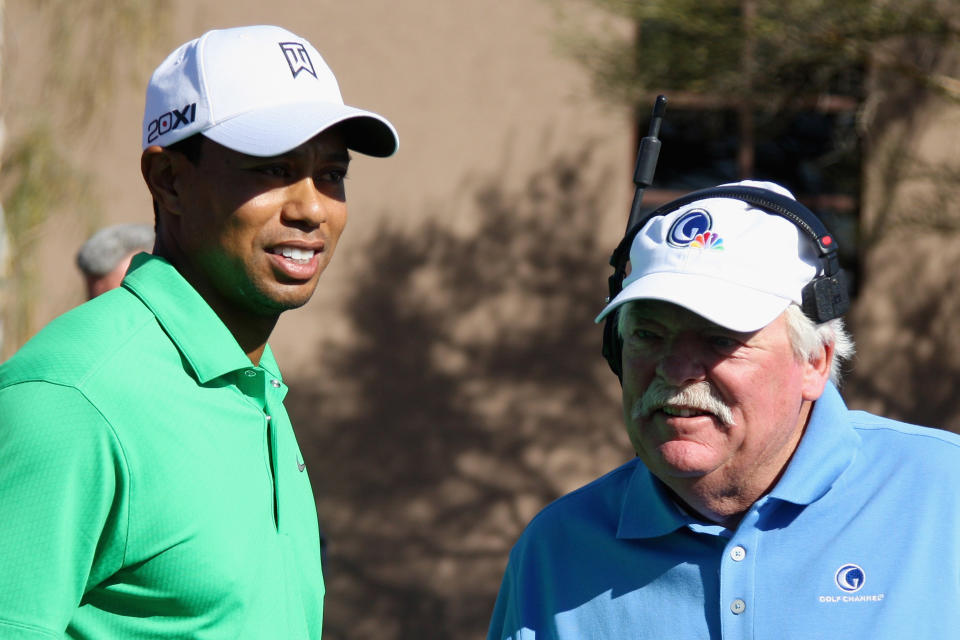
RM: I was in the tower at 18 doing the ESPN broadcast of the U.S. Open with Chris Berman at Pebble in 2000. On the 6th hole, Tiger had driven it in the right rough, the par-5, and of course the second shot you have to hit it up over the cliff. Certainly if you hit it right, you’re staring right at the cliff, and there used to be a tree that grew up out of there that is now gone, has died or fallen over, whatever.
At any rate, we’d seen a number of guys out there, and they all had to pitch out kind of sideways short of that hill because they couldn’t carry it up on top. You didn’t want to be in the face of that hill, but then they’d have a blind third shot.
Anyway, Tiger wanders in there with an iron, and the next thing he’s aiming to go over this cliff. I’m like, I can’t believe he’s doing this. He moves heaven and earth, and he hits the ball up on the green out of there.
My response was “just not a fair fight.” I’ll get that one mentioned.

